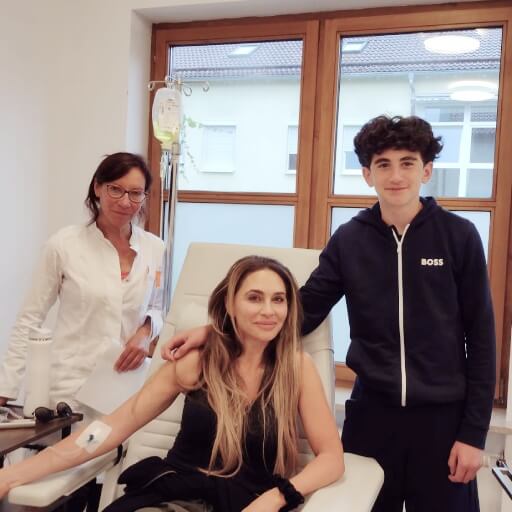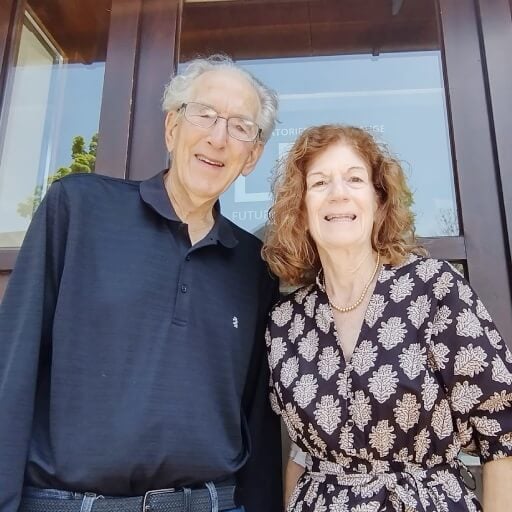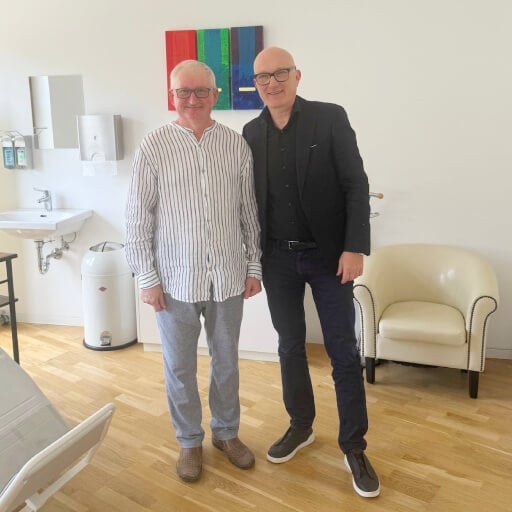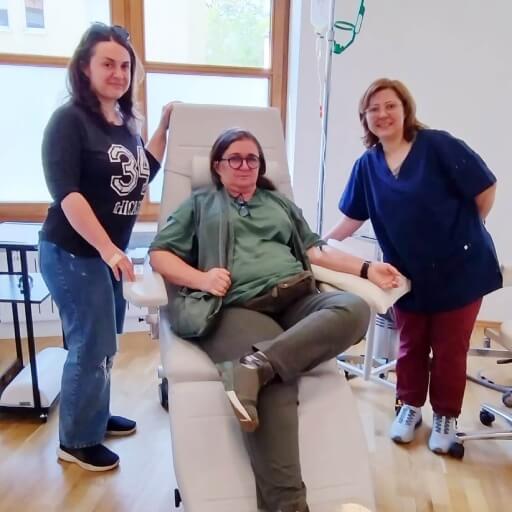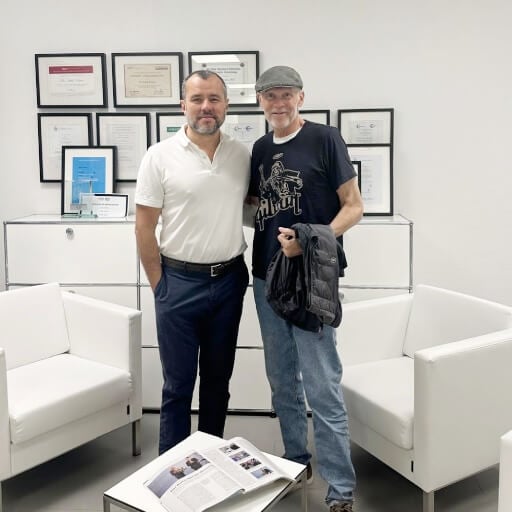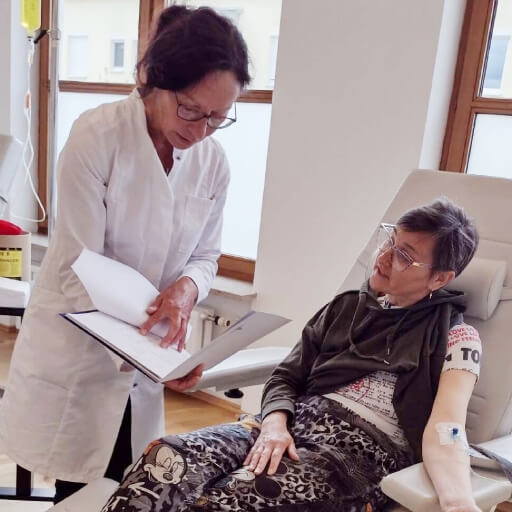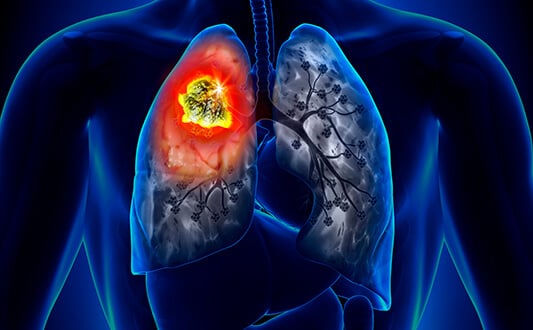Imagine a treatment that boosts your own immune response to fight lung cancer with precision, causing virtually no side effects while you maintain your daily routine. Dendritic cell therapy offers this possibility to patients at any cancer stage, showing effectiveness rates of 50-65% across various cancer types.
With lung cancer affecting 226,650 new patients annually [1] and survival rates ranging from 67% for early-stage to 12% for advanced disease [3], German clinics pioneer this personalized immunotherapy by creating individual DC vaccines for your tumor cells’ unique characteristics. Unlike traditional treatments that attack healthy cells alongside cancer, this approach trains your body's natural immune response to target only malignant cells.
The procedure requires just two outpatient visits – one for consultation and blood collection, then one injection after a week of DC vaccine preparation, with patients often continuing normal activities, including exercise, throughout treatment. As this innovative therapy affects immune response, it can work alone or enhance conventional treatments, offering new hope even when other options have been exhausted.
Understanding Lung Cancer: Types and Stages
Lung cancer has two main types: non-small cell lung cancer (NSCLC), which makes up about 87% of cases, and small cell lung cancer (SCLC), representing 13% of diagnoses. NSCLC is more common and typically grows more slowly than SCLC. [1]
Doctors use staging to describe how far cancer has spread. Early-stage cancer is contained within the lung, while advanced stages indicate the cancer has spread to nearby lymph nodes or distant parts of the body. [2]
Survival rates depend heavily on when cancer is detected [3]:
- Early-stage lung cancer: 67% of patients survive five years when caught early
- Cancer spread to nearby areas: 40% five-year survival rate
- Cancer spread to distant organs: 12% five-year survival rate
The American Cancer Society estimates about 226,650 new lung cancer cases in 2025. Lung cancer primarily affects older adults, with most patients diagnosed around age 70. While these statistics may seem concerning, survival rates are improving thanks to better treatments and earlier detection methods. [1]
Modern treatment approaches, including dendritic cell therapy, affect anticancer immune responses and offer new hope for patients at all stages. Each patient's situation is unique, and treatment decisions should always be made in consultation with experienced oncologists who can provide personalized care based on individual circumstances and the specific characteristics of each cancer case.
The Science Behind Dendritic Cell Therapy for Lung Cancer
The scientific foundation for this approach was established by 2011 Nobel Prize winner Ralph Steinman, whose groundbreaking research demonstrated how dendritic cells function as the immune response commanders. His work showed how these special cells act as the body's security system, identifying threats and coordinating the immune response. [4]
Understanding Dendritic Cells
Dendritic cells are specialized white blood cells that serve as the connection between your body's immediate defense system and its more targeted immune responses. Think of them as highly trained security officers who can recognize dangerous intruders and then alert the entire security force about what to look for.
In lung cancer, these immune cells play a crucial role by recognizing cancer antigens – unique markers found on cancer cell surfaces. The natural cancer-fighting process works through a coordinated sequence where dendritic cells capture information about the cancer and present it to T-lymphocytes, the immune system's attack cells. Once T-lymphocytes receive this information, they actively seek out and destroy cancer cells while teaching other immune cells what to target and creating a robust immune response. [5]
The main challenge in cancer treatment is that the immune response often doesn't naturally recognize cancer cells as threats. Cancer cells can disguise themselves and avoid detection by the immune system, allowing tumor cells to grow undetected. This is where dendritic cell therapy becomes valuable.
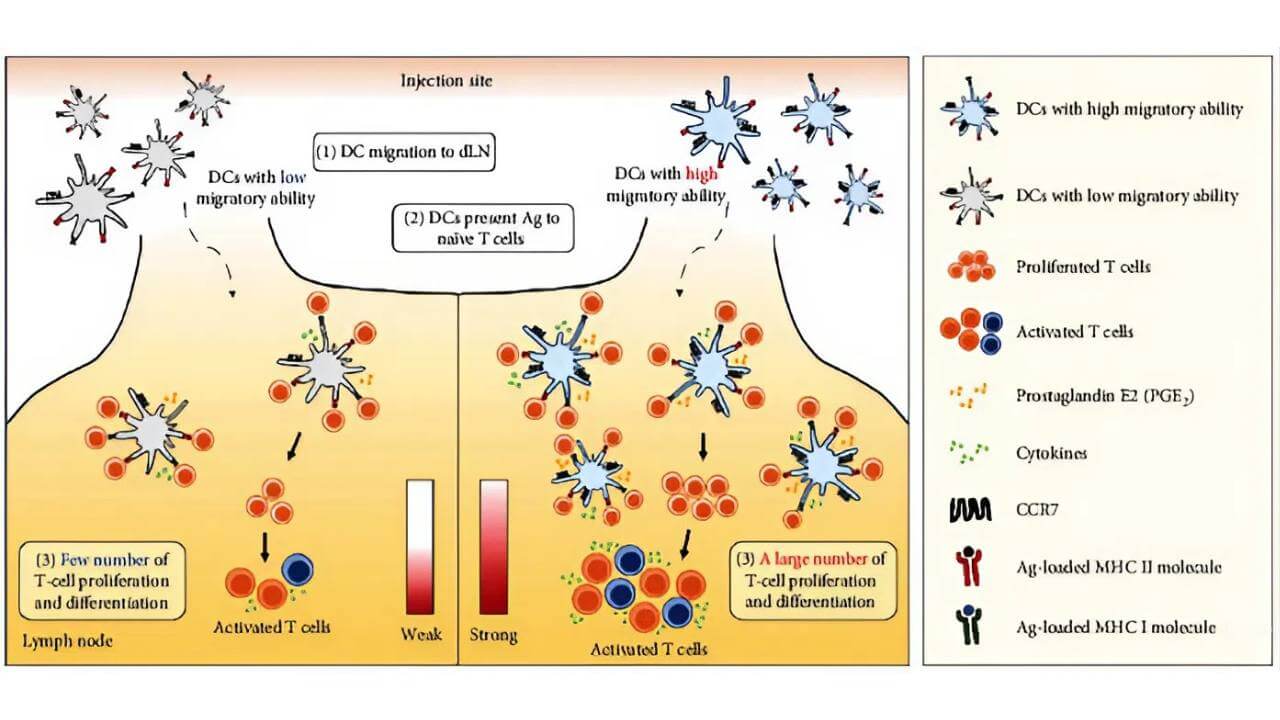
How Dendritic Cell Therapy Works in Lung Cancer
In this treatment approach, doctors use the following process:
- Collection. Dendritic cells are gathered from the patient's blood through a simple procedure.
- Education. These cells are trained in the laboratory to recognize specific lung cancer characteristics using tumor cells’ antigens and boost the immune response.
- Reintroduction. The educated dendritic cells are returned to the patient's body through injection.
- Activation. The trained cells teach the immune system to identify and attack cancer cells effectively to create a lifelong immune response.
The therapy essentially gives the immune system clear instructions about what cancer cells look like, enabling a more effective and targeted immune response against lung cancer. This approach works with the body's natural immune response, potentially offering better outcomes with fewer side effects than traditional treatments alone.
Patient Selection Criteria for Dendritic Cell Therapy in Lung Cancer
Dendritic cell therapy offers hope for a wide range of lung cancer patients. Unlike many conventional treatments that have strict eligibility requirements, DC vaccination safely affects the immune response and can be considered for patients at all stages of lung cancer, from early-stage disease to advanced metastatic cases. Even patients who have exhausted other treatment options or those considered too debilitated for aggressive conventional therapies may still be candidates for dendritic cell vaccination. [7]
Medical Evaluation Process
Patient selection typically involves several key considerations that doctors evaluate during the initial consultation. The patient's recent medical records provide essential information about their current condition and treatment history. Laboratory tests help determine if the patient's immune system can support dendritic cell therapy, ensuring the body has sufficient healthy cells for the immune response to work with during the treatment process.
Doctors assess whether patients can safely undergo the blood collection procedure required to obtain dendritic cells. This involves checking blood cell counts and overall health status to ensure the patient can tolerate the process without complications. Unlike chemotherapy or radiation therapy, dendritic cell therapy doesn't require lung cancer patients to have perfect health or high performance scores.
Ideal Lung Cancer Candidates for Treatment
The following factors support candidacy for dendritic cell therapy:
- Any cancer stage: From early-stage tumors following surgery to advanced metastatic disease
- Previous treatment history: Patients who have received chemotherapy, radiation, or surgery remain eligible
- Compromised health status: Even debilitated lung cancer patients may benefit when other treatments aren't suitable
- Treatment resistance: Patients whose cancers no longer respond to conventional therapies are eligible
- Combination approach: Those seeking to enhance the effectiveness of current treatments by boosting the natural immune response
The individualized nature of dendritic cell therapy means that treatment plans are customized based on each patient's specific tumor cells’ characteristics and health condition. This personalized approach allows doctors to create DC vaccines tailored to the unique features of each patient's cancer, making the anticancer immune response possible even in challenging cases where standard treatments have limited success.
What Does the Dendritic Cell Vaccination for Lung Cancer Involve?
The dendritic cell therapy process is simple and safe. Everything happens on an outpatient basis – you come to the clinic, receive treatment, go home the same day, and have your boosted anticancer immune response.
Step 1: Your First Visit
During your initial appointment, the doctor will review your medical history and perform a basic examination. You'll have simple blood tests to check your overall health and ensure the treatment is right for you. Then, we collect 150-200 ml of your blood – about the same amount as a regular blood donation. Your blood contains tumor antigens and special immune cells that doctors will use to create your personalized DC vaccine.
Step 2: Creating Your DC Vaccine
The laboratory needs seven days for trained dendritic cell development and preparation of your individual DC vaccine. Your tumor releases specific markers into your bloodstream, and doctors use liquid biopsy to capture the actual tumor cells’ antigens from your blood sample. This approach ensures your immune cells are trained against the real, current version of your cancer, and the immune response is strong.
During this time, your immune cells learn to recognize and attack your specific lung cancer cells. The process of trained dendritic cell development happens entirely in the lab while you continue your normal activities at home.
Step 3: Receiving Your Treatment
After one week, you return to the clinic for a simple injection. The DC vaccine is given just under the skin near your lymph nodes. The procedure is quick and well-tolerated – most patients experience no significant side effects.
You'll stay under medical supervision for a short time after the injection, but there's no need for hospitalization. A complete treatment course requires only one injection to build strong cell immunity against your cancer.
The entire procedure is designed to work with your body's natural immune response while causing minimal disruption to your daily life.
Treatment Outcomes by Lung Cancer Stage
The goals of administering the vaccine differ depending on the stage of lung cancer and previous treatment:
- Vaccination for early-stage cancer helps a patient to enter remission by destroying the atypical cells remaining after the operation. A prerequisite, in this case, is surgical tumor removal because the DC vaccine will not be able to destroy large malignant foci in the lung tissue.
- Vaccination for stage 4 cancer suppresses the growth of existing metastases and the formation of new ones. In such a situation, doctors seek to relieve symptoms (for example, improving respiratory function or reducing the risk of bleeding) and better control the disease.
- The administration of a dendritic cell vaccine also serves as a prevention of cancer recurrence because a patient forms an immunological memory, and new cells with similar malignant mutations will be quickly destroyed.
Another promising application of dendritic cells for advanced lung cancer is their combination with the Newcastle disease virus and γδ T cell therapy. In clinical studies, combination treatment has shown the highest efficacy in patients with advanced cancer.
Professional Medical Opinions on Dendritic Cell Therapy in Lung Cancer
Prof. Frank Gansauge from LDG Laboratories in Germany brings over 22 years of experience specifically in dendritic cell therapy for cancer treatment. His clinic has been pioneering this immunotherapy since 2001, making it one of the first private laboratories to offer dendritic cell vaccination.
According to Prof. Gansauge, dendritic cell therapy demonstrates effectiveness rates of 50-65% across various cancer types, including lung cancer. "Already after three months, a doctor can see whether the patient's condition has improved," he notes, with outcomes measured through imaging studies that assess complete tumor cell disappearance, shrinkage, or stability.
The clinic has demonstrated significant increases in average life expectancy for lung cancer patients and achieved complete responses in some cases, with patients showing no tumor recurrence after five years. Prof. Gansauge's approach focuses on creating individualized dendritic cell vaccines tailored to each patient's specific tumor cells’ antigens.
Prof. Gansauge emphasizes that dendritic cell therapy causes "practically no side effects" according to his clinical experience. The German regulatory framework ensures manufacturing standards under the oversight of the European Medicines Evaluation Agency and the Paul Ehrlich Institute, providing rigorous quality control for dendritic cell vaccine production.
Prof. Gansauge stresses the importance of seeking dendritic cell therapy only at facilities with proper regulatory approval for vaccine manufacturing, highlighting Germany's stringent oversight that ensures both safety and efficacy in this innovative cancer immunotherapy approach.
Expert Insights from Prof. Gansauge: The Power of Dendritic Cell Therapy in Cancer Treatment
Comparing Treatment Options: Dendritic Cells vs. Traditional Lung Cancer Therapies
Understanding different treatment approaches helps patients and their families make informed decisions about lung cancer care. Each treatment option offers unique benefits, and the best approach often involves combining multiple therapies for optimal results.
| Aspect | Dendritic Cell Therapy | Surgery | Chemotherapy | Radiation Therapy |
|---|---|---|---|---|
| Treatment Type | Immunotherapy using the patient's own cells | Physical tumor removal | Chemical drugs | High-energy radiation |
| Side Effects | Minimal to none | Surgical risks, recovery time | Severe: nausea, hair loss, fatigue | Fatigue, skin irritation, breathing issues |
| Hospital Stay | Outpatient, same day | Several days to weeks | Outpatient cycles | Daily sessions for weeks |
| Hair Loss | No hair loss | No hair loss | Complete hair loss common | Possible in treatment area |
| Immune System | Strengthens natural cell immunity | No cell immunity impact | Weakens immune response | May affect cell immunity function |
| Cancer Stage | All stages, including advanced | Early to mid-stage only | All stages | Localized areas |
| Personalization | Fully customized to patient's tumor | Standard surgical approach | Standard drug protocols | Standard radiation doses |
| Long-term Protection | Creates immune memory, lifelong cell immunity | No ongoing protection | No ongoing protection | No ongoing protection |
This comparison is for educational purposes. Treatment decisions should always be made in consultation with qualified oncologists who can evaluate individual patient circumstances and provide personalized medical advice.
Real Lung Cancer Patient Stories and Outcomes
Susan Clark Livingston from the USA received dendritic cell therapy at LDG Laboratories Dr. Gansauge Berg in Germany after being diagnosed with advanced lung cancer. Her doctors in the United States had given her a prognosis of six months to live.
At the time of this account, Susan had already exceeded her original six-month prognosis by a year and a half while undergoing dendritic cell therapy. Her family member described her current condition: "By the way, she still looks fabulous, she has a full, beautiful mane of red hair, and she's still the same waist size she was as a teenager. Despite the lung cancer, she's still going for a run almost every morning, and looks as good as she did twenty two years ago."
The treatment took place in facilities described by her family as comfortable and non-clinical in atmosphere. "The facilities are comfortable. It doesn't feel like a scary hospital room. It's sunny, beautiful, and homey." The medical team, led by Prof. Dr. Gansauge and Dr. Taubert, provided comprehensive care with dedicated support staff including coordinators Claudia and Julia who helped manage the treatment process.
Susan's family noted specific aspects of her experience:
- Physical condition maintained: She continues regular morning runs and maintains her physical appearance despite advanced cancer
- Hair preservation: Unlike traditional chemotherapy, she retained her "full, beautiful mane of red hair"
- Daily activity continuation: She remains active in her daily routine without significant limitations
- Supportive care environment: The clinic provided both medical expertise and emotional support throughout treatment
- Coordinated international care: Staff assistance helped navigate the complexities of receiving treatment abroad
Her family expressed confidence in the ongoing treatment, stating: "I have complete confidence in your program and faith that your treatment will continue to work." The case was managed under the care of Prof. Dr. Gansauge and Dr. Taubert at the German facility, with Susan receiving the personalized dendritic cell therapy protocol developed specifically for her lung cancer case.
"Thanks to the brilliance and diligence of Professor Gansauge and Dr. Taubert, my mother has outlived her original diagnosis by a year and a half," Julia shared. "She still goes for morning runs, has a full head of red hair, and looks as radiant as she did in her youth."
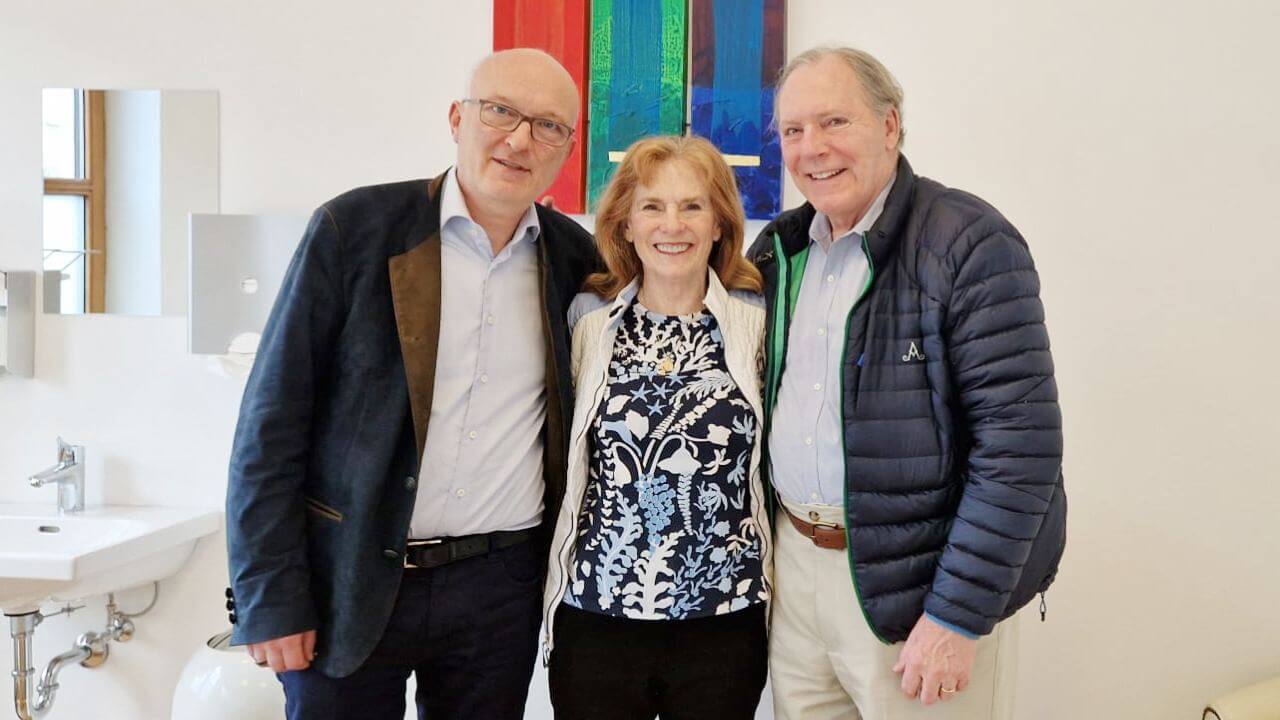
Getting Dendritic Cell Treatment for Lung Cancer in Germany
Using dendritic cells for lung cancer treatment is an alternative treatment approach that may help manage symptoms, including pain, and potentially improve prognosis by stimulating the immune system to target tumor cells. This innovative therapy plays a crucial role in activating the body's natural defenses, potentially leading to the production of antibodies against cancer cells. While individual results may vary, the potential benefits of dendritic cell therapy include a more targeted approach to fighting lung cancer, possibly reducing side effects compared to traditional treatments.
Treatment Availability in German Medical Facilities
Dendritic cell therapy for lung cancer is available in German medical facilities to international patients regardless of nationality or country of residence. The treatment process involves creating personalized vaccines using the patient's own immune cells and tumor material, requiring specialized laboratory capabilities and experienced medical teams.
German hospitals offering dendritic cell therapy typically provide comprehensive cancer care that may combine this immunotherapy with conventional treatments such as surgery, chemotherapy, or radiation therapy. The individualized nature of dendritic cell therapy means that each patient's treatment plan is developed based on the specific characteristics of their tumor cells and overall health condition.
Support Services for International Lung Cancer Patients
Medical tourism company Booking Health facilitates access to dendritic cell therapy for international patients. With over 12 years of experience organizing lung cancer treatments in German clinics, such services help bridge the gap between patients seeking advanced treatments and specialized medical facilities. Treatment costs can be checked through their website, and they provide transparent pricing without additional fees for foreign patients.
Support services for international patients typically include:
- Assistance in selecting appropriate clinics and doctors specializing in dendritic cell therapy
- Pre-treatment consultation through remote communication with selected physicians
- Development of comprehensive treatment programs that may include dendritic cell therapy alongside other necessary treatments
- Appointment scheduling coordinated according to patient preferences and medical urgency
- Independent medical oversight to monitor treatment progress and quality
- Post-treatment support including medication procurement and forwarding for continued care
- Administrative management of invoices, payments, and return of unused deposits
- Organization of supplementary examinations or rehabilitation programs as needed
- Travel coordination including flights, transfers, accommodation, and daily logistics
- Professional interpreting services throughout the treatment process
Dedicated coordinators provide continuous support throughout the treatment journey, maintaining availability until patients return home. This approach addresses both medical and practical aspects of receiving specialized cancer therapy abroad, helping patients navigate the complexities of international medical care.
Personalized Dendritic Cell Treatment: Experience with Booking Health
FAQ About Lung Cancer Therapy with Dendritic Cells
Send request for treatmentDendritic cells play a crucial role in the immune response by identifying and presenting cancer cells to the immune system. In lung cancer therapy, these cells are modified to target lung cancer cells specifically, enhancing the body’s ability to fight the disease.
Benefits include a personalized and targeted treatment approach, reduced side effects compared to conventional treatments, and the potential for long-term remission. This therapy can be particularly effective for patients with advanced or metastatic lung cancer.
The process involves extracting dendritic cells from the patient, modifying them to recognize lung cancer cells, and reintroducing them into the patient’s body. This stimulates the immune system to attack the cancer cells more effectively.
Success rates vary based on individual patient factors and the stage of cancer. However, many patients have reported significant improvements in their condition, with some achieving long-term remission.
Most risks are mild and temporary, such as fever and fatigue. Severe side effects are rare but can occur, necessitating close monitoring by healthcare professionals during treatment.
Dendritic cell therapy is a personalized immunotherapy that trains your immune system to recognize and attack cancer cells by using your own immune cells modified in the laboratory to target your specific tumor cells’ characteristics.
Clinical experience shows effectiveness rates of 50-65% across various cancer types, with patients often seeing results within three months through improved immune system response and potential clinical benefit, including disease stabilization.
Yes, this treatment is available for both non-small cell lung cancer (87% of cases) and small cell lung cancer (13% of cases), regardless of cancer stage, including advanced lung cancer and stage 4 lung cancer.
The complete treatment requires only two outpatient visits – one for consultation and blood collection, then one injection after a week of vaccine preparation, making it a convenient process.
Germany offers pioneering expertise in this field with rigorous regulatory oversight ensuring safety and quality, plus specialized cancer clinics with experienced teams providing comprehensive treatment in Germany.
The therapy works by creating individualized vaccines from your tumor cells’ unique characteristics, training immune cells to target specific markers found on both types of lung cancer cells effectively.
Patients at any cancer stage can be considered, including those who have exhausted other treatments, are too debilitated for aggressive therapies, or seek enhanced outcomes through personalized approaches.
Yes, combination treatment is possible and often beneficial, allowing this immunotherapy to enhance conventional treatments while potentially reducing their side effects and improving overall outcomes.
Studies demonstrate 50-65% effectiveness rates with patients maintaining normal activities during treatment, including exercise, while experiencing minimal side effects compared to traditional therapies.
Yes, German medical facilities offer this treatment through specialized immunotherapy programs to international patients regardless of nationality, with comprehensive support services available.
The dendritic therapy cost ranges from €20,000 to €38,000, with transparent pricing and support services helping manage medical travel expenses and lung cancer treatment price considerations.
The cost depends on the complexity of the case and the individual treatment plan. It includes the preparation of the vaccine, a doctor's consultation and the administration of the cells according to GMP standards.
Unlike surgery, chemotherapy or radiotherapy, dendritic cell therapy activates the immune system to recognize and destroy cancer cells on its own. The treatment is personalized and safe.
Dendritic cell therapy has almost no side effects: patients may experience mild fatigue or a slight increase in temperature, unlike chemotherapy with nausea, hair loss and immune suppression.
No, the procedure is performed on an outpatient basis. The patient comes in for a blood draw and a vaccine, and then goes home the same day. Unlike surgery or radiotherapy there is no need to stay in the hospital.
No, the therapy does not cause hair loss. Because it stimulates the immune system, the patient maintains a normal appearance and can lead a normal lifestyle during treatment.
Yes, it can be used at any stage. It can be combined with surgery, chemotherapy or radiotherapy to improve results.
Yes, the therapy creates immune memory: the body recognizes and destroys cancer cells when they reappear. This reduces the risk of relapse and maintains long-term control of the disease.
Choose treatment abroad and you will for sure get the best results!
Authors:
This article was edited by medical experts, board-certified doctors Dr. Nadezhda Ivanisova, and Dr. Bohdan Mykhalniuk. For the treatment of the conditions referred to in the article, you must consult a doctor; the information in the article is not intended for self-medication!
Our editorial policy, which details our commitment to accuracy and transparency, is available here. Click this link to review our policies.
Sources:
[1] American Cancer Society. Key Statistics for Lung Cancer. https://www.cancer.org/cancer/types/lung-cancer/about/key-statistics.html
[2] Cancer Research UK. TNM staging for lung cancer. https://www.cancerresearchuk.org/about-cancer/lung-cancer/stages-types/tnm-staging
[3] American Cancer Society. Lung Cancer Survival Rates. https://www.cancer.org/cancer/types/lung-cancer/detection-diagnosis-staging/survival-rates.html
[4] Roman Volchenkov, Florian Sprater, Petra Vogelsang, Silke Appel. The 2011 Nobel Prize in physiology or medicine. Scand J Immunol. 2012 Jan;75(1):1-4. doi: 10.1111/j.1365-3083.2011.02663.x. [DOI] [PubMed]
[5] Ahmed Salah, Hao Wang, Yanqin Li, Meng Ji et al. Insights Into Dendritic Cells in Cancer Immunotherapy: From Bench to Clinical Applications. Front Cell Dev Biol. 2021 Jun 28:9:686544. doi: 10.3389/fcell.2021.686544. [DOI] [PubMed]
[6] Min-Seon Song, Ji-Hee Nam, Kyung-Eun Noh, Dae-Seog Lim. Dendritic Cell-Based Immunotherapy: The Importance of Dendritic Cell Migration. J Immunol Res. 2024 Apr 8;2024:7827246. doi: 10.1155/2024/7827246. [DOI] [PMC free article]
[7] Dieter Stevens, Joline Ingels, Sandra Van Lint , Bart Vandekerckhove, Karim Vermaelen. Dendritic Cell-Based Immunotherapy in Lung Cancer. Front Immunol. 2021 Feb 12;11:620374. doi: 10.3389/fimmu.2020.620374. [DOI] [PMC free article]
Read:
Lung Cancer Treatment in Germany: All New and Most Effective Treatment Options
Comprehensive Guide to 4 Stage Lung Cancer Treatment Options
Article menu:
- Understanding Lung Cancer: Types and Stages
- The Science Behind Dendritic Cell Therapy for Lung Cancer
- Patient Selection Criteria for Dendritic Cell Therapy in Lung Cancer
- What Does the Dendritic Cell Vaccination for Lung Cancer Involve?
- Treatment Outcomes by Lung Cancer Stage
- Professional Medical Opinions on Dendritic Cell Therapy in Lung Cancer
- Comparing Treatment Options: Dendritic Cells vs. Traditional Lung Cancer Therapies
- Real Lung Cancer Patient Stories and Outcomes
- Getting Dendritic Cell Treatment for Lung Cancer in Germany
- FAQ About Lung Cancer Therapy with Dendritic Cells
Don't know where to start?
Contact Booking Health
